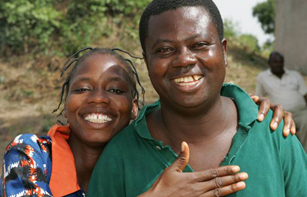WHO and UNAIDS hail results from the HPTN 052 trial that show antiretroviral therapy to be 96% effective in reducing HIV transmission in couples where one partner has HIV

Credit: UNAIDS/P.Virot.
GENEVA, 12 May 2011—Results announced today by the United States National Institutes of Health show that if an HIV-positive person adheres to an effective antiretroviral therapy regimen, the risk of transmitting the virus to their uninfected sexual partner can be reduced by 96%.
“This breakthrough is a serious game changer and will drive the prevention revolution forward. It makes HIV treatment a new priority prevention option,” said Michel Sidibé, Executive Director of the Joint United Nations Programme on HIV/AIDS (UNAIDS). “Now we need to make sure that couples have the option to choose Treatment for Prevention and have access to it.”
The trial, conducted by the HIV Prevention Trials Network, enrolled more than 1 700 sero-discordant couples (one partner who is HIV-positive and one who is HIV-negative) from Africa, Asia, Latin America and the United States of America.
Only people living with HIV with a CD4 cell count of between 350 and 550, thus not yet eligible for treatment for their own health according to latest WHO guidelines, were enrolled in the study. The reduction of sexual transmission of HIV was so significant that the trial was stopped 3-4 years ahead of schedule.
"This is a crucial development, because we know that sexual transmission accounts for about 80% of all new infections," said Dr Margaret Chan, WHO Director-General. "The findings from this study will further strengthen and support the new guidance that WHO is releasing in July to help people living with HIV protect their partners."
The availability of Treatment for Prevention will not only empower people to get tested for HIV, but also to disclose their HIV status, discuss HIV prevention options with their partners and access essential HIV services. It will also significantly contribute to reducing the stigma and discrimination surrounding HIV.
“People living with HIV can now, with dignity and confidence, take additional steps to protect their loved ones from HIV,” said Mr Sidibé.
It is currently estimated that only about half of the 33 million people living with HIV know their HIV status. An increase in the uptake of testing for HIV would have a significant impact on the AIDS response, particularly if more people gain access to treatment in light of the new findings.
UNAIDS and WHO recommend that couples make evidence-informed decisions on which combination of HIV prevention options is best for them. UNAIDS urges that Treatment for Prevention be one of the options made available to couples. The new WHO guidelines coming out in July will help countries to make this a reality for people who choose to use this new HIV prevention option. The guidelines will include specific recommendations on increasing access to HIV testing and counseling and the use of antiretroviral therapy among discordant couples.
No single method is fully protective against HIV. Treatment for Prevention needs to be used in combination with other HIV prevention options. These include correct and consistent use of male and female condoms, waiting longer before having sex for the first time, having fewer partners, male circumcision, and avoiding penetrative sex. The significance of the findings put Treatment for Prevention firmly in the HIV prevention package.
To increase access to the Treatment for Prevention option, the Treatment 2.0 initiative must be urgently implemented to innovate, simplify, reduce costs and mobilize communities to scale up HIV testing and counseling and treatment.
UNAIDS will convene a partners meeting to further discuss this new development and its implications for the AIDS response. This builds on a series of expert consultations which have been convened by UNAIDS and WHO on Treatment for Prevention during the last two years.
UNAIDS and WHO will work with countries and partners to make Treatment for Prevention an integral part of the HIV response and to ensure it is made available to people who wish to use it as soon as possible.



